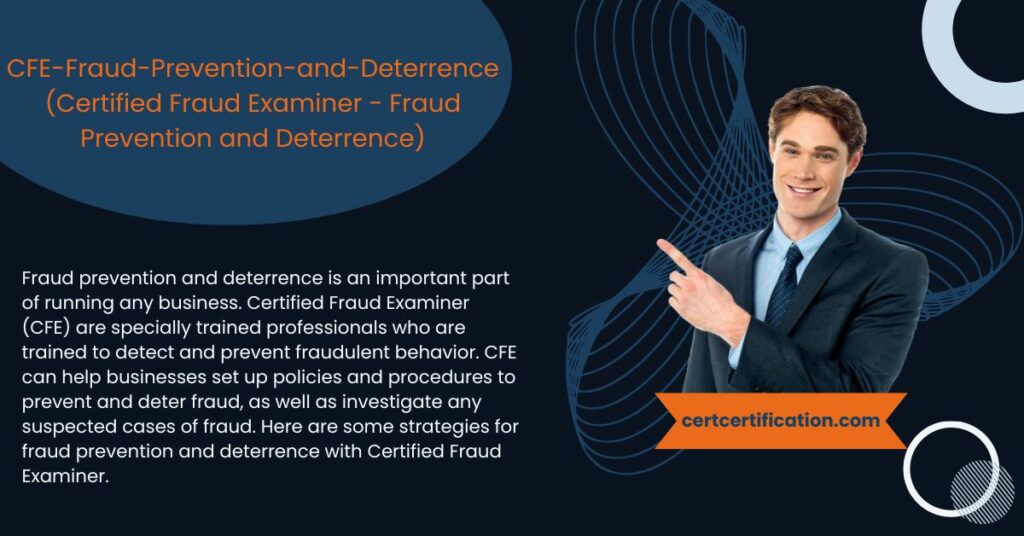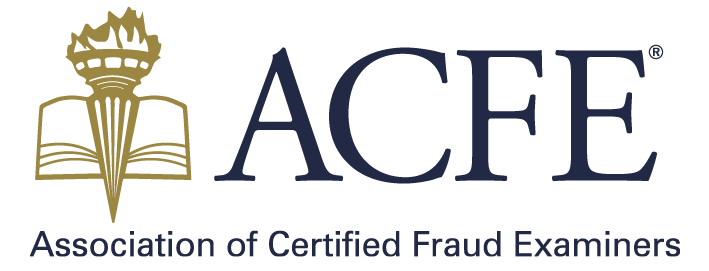Introduction
A CFE is a professional who has been trained and certified to detect, investigate, and prevent fraud. CFEs are responsible for using their specialized knowledge and experience to identify and deter fraud schemes, which can range from financial statement fraud to money laundering. CFE possess a unique set of skills, including the ability to analyze financial statements, interpret legal documents, and conduct investigations. Additionally, CFEs are trained to detect red flags, such as discrepancies or unusual patterns in financial information. They also have the ability to use various investigative techniques, including interviewing witnesses and gathering evidence. By using their skills and experience, CFEs can help organizations prevent and deter fraud.
How Certified Fraud Examiner are Helping to Fight Financial Fraud and Waste
CFE play an important role in the fight against financial fraud and waste. With their expertise and specialized training, CFEs are working to detect, investigate, and prevent fraud, helping to protect individuals, organizations, and governments from financial losses.
CFE are trained to identify the signs of financial fraud and to develop strategies to detect and prevent it. They are knowledgeable in a variety of investigative techniques, including interviewing witnesses, analyzing financial documents, and utilizing forensic accounting principles. They are able to uncover suspicious activities that may have gone undetected by other methods.
CFE are employed in a variety of settings, including law enforcement, government, and private industry. They are tasked with investigating cases of fraud and waste, identifying patterns of suspicious activity, and providing evidence for prosecution. In some cases, they may also be called upon to provide expert testimony in court proceedings.
CFE use their expertise to help organizations reduce the risk of fraud and financial losses. They do this by developing and implementing anti-fraud strategies, such as internal controls and fraud risk assessments. They also work with organizations to identify vulnerabilities that could be exploited by fraudsters and to develop systems to detect and prevent fraud.
In addition, CFE help organizations to recover funds that have been lost to fraud. They can assist in tracing funds that have been misappropriated and in identifying and recovering assets that have been hidden or moved offshore.
CFE are also working to raise public awareness about the risks of financial fraud and how to prevent it. Through education, they are helping to increase the knowledge of individuals and organizations about the risks of fraud and how to protect themselves.
By working to detect, investigate, and prevent financial fraud and waste, CFE are making a positive impact in the fight against financial fraud and waste. They are playing an essential role in protecting individuals, organizations, and governments from financial losses.

The Benefits of Having a Certified Fraud Examiner on Your Team
Having a CFE on a business’s team can provide a wide array of advantages. CFEs are highly trained professionals who specialize in the prevention, detection, and investigation of fraud and white-collar crimes. They are equipped with the knowledge and skills to help protect an organization from any potential financial losses due to fraudulent activities.
The most significant benefit of having a CFE on a team is the prevention of fraud. CFEs have the expertise to recognize and interpret red flags that indicate possible fraudulent activities. They can also implement fraud prevention strategies such as internal controls, fraud awareness training, and audit procedures. In addition, CFEs can conduct risk assessments to identify fraud vulnerability and suggest appropriate remediation plans.
A CFE can also provide an organization with a comprehensive review of financial records and transactions. CFEs are trained to analyze data and identify patterns that may indicate fraudulent activities. They can also investigate suspicious activities and prepare reports that provide evidence of criminal activity.
The investigative capabilities of a CFE can be especially beneficial during litigation. CFEs can assist in the collection of evidence and the development of testimony. They can also help maximize the potential recovery of stolen funds and assets.
In short, having a CFE on a team can provide an organization with a variety of advantages. The expertise and investigative capabilities of a CFE can help protect an organization from financial losses due to fraud. In addition, CFEs can provide an organization with the necessary support during litigation. By having a CFE on their team, businesses can be better equipped to prevent, detect, and investigate fraudulent activities.
Strategies for Fraud Prevention and Deterrence with Certified Fraud Examiner
Fraud prevention and deterrence is an important part of running any business. CFE are specially trained professionals who are trained to detect and prevent fraudulent behavior. CFEs can help businesses set up policies and procedures to prevent and deter fraud, as well as investigate any suspected cases of fraud. Here are some strategies for CFE.
1. Establish a Culture of Ethics and Integrity: A culture of ethics and integrity is essential to any organization. CFEs can help create and enforce policies and procedures that promote ethical behavior and compliance with laws and regulations. This includes developing policies around conflict of interest, whistleblower protection, and proper financial reporting.
2. Implement Internal Controls: Internal controls are an important part of any business’s strategy. CFEs can help create and monitor internal controls to ensure that financial information is accurate and that fraud is detected quickly. These controls might include segregation of duties, physical security, and access controls.
3. Create a Fraud Risk Assessment: CFEs can help businesses create a fraud risk assessment to identify and assess any potential areas of fraud risk. The assessment can help businesses prioritize prevention and deterrence efforts and create a plan for responding to any potential incidents.
4. Train Employees: Employees should be trained on policies and procedures relating. CFEs can help create and deliver training programs that educate employees about fraud risks and how to report any suspicious activity.
5. Monitor Transactions: CFEs can help businesses monitor financial transactions to detect any suspicious or fraudulent activity. This might include tracking unusual patterns in purchases or sales, or monitoring employee expense reports.
By implementing these strategies with the help of a CFE, businesses can create effective programs that protect their assets and reputation.

Conclusion
The CFE is essential. With the knowledge and skills gained from the CFE, fraud examiners can help organizations identify and prevent fraud, as well as develop effective strategies. The CFE can help organizations protect their financial assets, reputation, and bottom line. Ultimately, the CFE is an invaluable tool for individuals and organizations alike in the fight against fraud.
Comments (0)